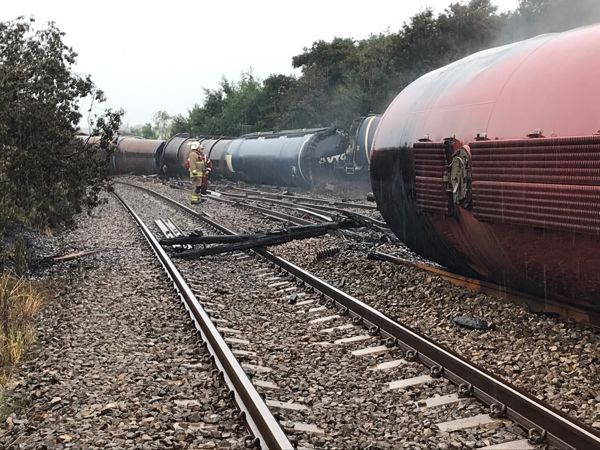Shell fisheries closed as a precaution after the Llangennech diesel spill can reopen

Cockle and shell fisheries that were closed as a precaution following the freight train derailment, fire and diesel spill in Llangennech on 26 August can reopen.
The Burry Inlet Cockle Fishery and other shell fisheries in the area were closed as a precaution following advice from the Food Standards Agency.
Extensive sampling and monitoring has been taking place and initial rounds of analysis of cockles and mussels in the area for residual oil contamination indicated they were within statutory limits, which are set to protect the health of consumers and the quality of the product.
As a precaution, a further round of samples were analysed. Those results have also come back within statutory limits.
A programme of surveillance and monitoring of shellfish will continue over the winter period to ensure the ongoing safety and quality of shellfish harvested from the area.
Local shellfish producers have been informed that the beds have been reopened with immediate effect and that harvesting can resume.
A spokesperson from the Food Standards Agency said:
“Laboratory Analysis by Centre for ecology fisheries and aquaculture science (Cefas) of the first two rounds of shellfish samples reported no evidence of diesel contamination of shellfish.
“The beds remained closed on a precautionary basis while we awaited the results of a third round of sampling and analysis.
“The additional results provide further evidence that testing results remain within the statutory limits, and as a result the beds have reopened.
"A programme of surveillance and monitoring over the winter period will continue, to ensure the ongoing safety and quality of the shellfish. The monitoring results will be kept under regular review.”
The clean-up operation of the incident site is now in recovery phase and is being led by Natural Resources Wales (NRW).
Multi-agency strategic and tactical groups have been established to coordinate the effort. They include representatives from NRW, Carmarthenshire County Council, City and County of Swansea, Network Rail, British Transport Police, Food Standards Agency, Welsh Government and Public Health Wales.
They’re working together to reduce any potential for impact of the incident on the local community, the environment and the economy.
Specialist contractors Adler and Allan and Jacobs remain at the incident site and are continuing with work to mitigate potential impact of the diesel spill.
Extensive monitoring, surveillance and modelling over the intervening period has shown that over 70 per cent of the diesel spilled has either evaporated or biodegraded, and the remainder has dispersed naturally in the wider environment.
Martyn Evans, Head of South West Operations for NRW and Chair of the Recovery Coordination Group, said:
“The reopening of the shell fisheries is a significant step forward in the road to recovery, and an indication that the multi-agency and specialist work to mitigate the impact is working.
“The measures have been significantly tested by heavy rains and Storm Alex, with no further seeping of diesel. But we will not be complacent in the management of this site.
“We are finalising long term plans for the treatment and monitoring of the site.”
A Stakeholder Recovery Group has been set up to keep people up to date with information and offer support to those affected overcome the impact of this incident. The group will also ensure people have the opportunity to voice any concerns.
It includes representatives from local businesses, commerce, tourism, fisheries and agriculture.
Sue Watts, Environmental Protection Manager, Carmarthenshire County Council, and Chair of the Tactical Recovery Group, said:
“Recovery from this is a complex task that requires expert advice, specialist support and continued monitoring.
“Unfortunately, there are people suffering the aftermath of this diesel pollution incident, and could be for months to come, particularly our local cockle gatherers and shellfish processors.”
The investigation into the cause of the freight train derailment is on-going. It is being investigated by the Rail Accident Investigation Branch and further detail can be found on Network Rail’s website.
For more information and advice visit https://naturalresources.wales/Llangennech.
